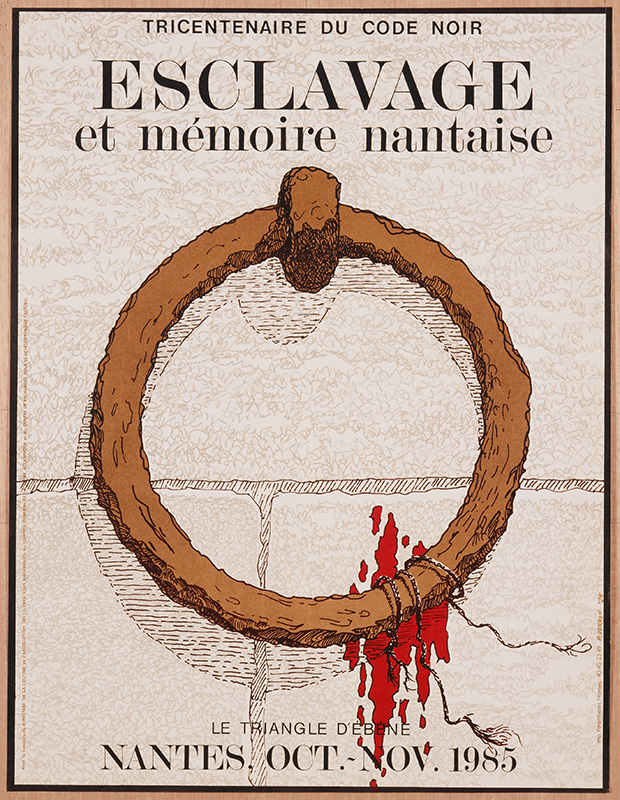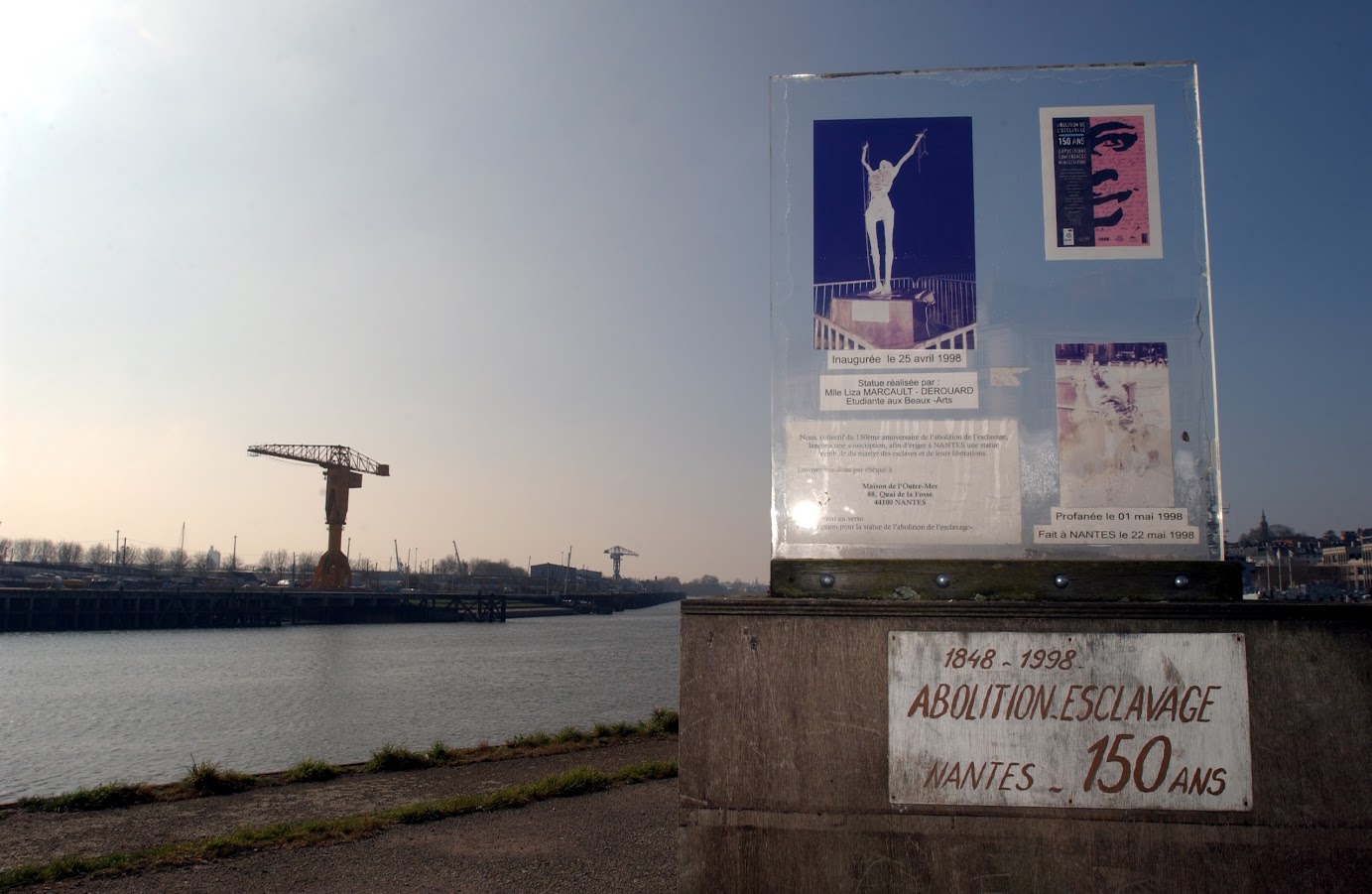The memorial in the city

An Urban Itinerary
While the Memorial to the Abolition of Slavery contributes to remembrance and the public record of memory in the city, the Nantes History Museum, located in the Château des Ducs de Bretagne, provides the keys to understanding the city’s slave-trading history, extensively presented in the permanent exhibit.
Both locations are connected through a walk in the streets of Nantes marked out by eleven information boards on the slave trade, with the title “Nantes and the slave trade”.
Located in iconic locations in the city that include the Quai de la Fosse and the Île Feydeau, the different panels present the slave trade system, how it developed in Nantes and its consequences for the city, both in terms of economy and development.
The walk stretches over 1.5 kilometers and takes about one hour.
possibility of downloading PDF versions of the information boards
The Nantes History Museum
The slave trade and slavery are part of the city’s history and identity. From the 17th century to the 19th century, the slave trade dominated Nantes’ commercial activities and contributed to the city’s accumulation of wealth.
The collections and the historical research carried out on the slave trade by the Nantes History Museum are recognized around the world.
While exploring the museum’s 12 rooms, visitors can learn about Nantes’ role in slave-trading Europe and how a slave trade campaign was organized, the identities of local ship owners and traders, how slaves were sold, and their lives on the plantations.
www.chateaunantes.fr
Local Players
Nantes Facing its Past: The Role of Associations and Civil Society
Beginning in the 1980s, the city’s long-hidden slave-trading past gradually began to come to light. Historians whose work addressed this little-known subject were at the forefront of this change. In 1985, at their initiative, an international colloquium on the slave trade was organized in Nantes. The city refused to finance the operation “Nantes 85,” which was intended to launch research and cultural programs about the slave trade, triggering a strong response by the associations and public that helped energize the discovery of the city’s slave-trading past.

In 1992, at their initiative, the first temporary exhibit dedicated to the slave trade and slavery, “The Shackles of Memory,” opened in Nantes and was highly successful. The exhibit lasted just over a year and helped the public to understand the slave trade and the role played by Nantes.
In 1998, a Nantes collective was created that united eleven associations to celebrate the 150th anniversary of the abolition. On April 24, 1998, an initiative by the association Mémoire de l’Outre Mer culminated in a unveiling of a commemorative sculpture at the Quai de la Fosse. The sculpture was vandalized a few days later.

In June 1998, the City decided to erect a commemorative monument, the Memorial to the Abolition of Slavery. It opened to the public in 2012, marking a new stage in the development of the knowledge and recognition of Nantes’ slave-trading past.
The associations in Nantes are currently continuing to promote historical awareness and remembrance of the slave trade, slavery and abolition. They host activities, visits and meetings at various locations in the city throughout the year. Their participation in the May 10 commemoration and numerous events such as Human Rights Day (December 10) show their dedication to freedom and human rights.
Principal local associations working for the history and remembrance of the slave trade, slavery and the abolition, including regular participants in the May 10 commemorations
AAGLA
Association des Antillais et Guyanais de Loire Atlantique
10 rue Marcel Hatet / 44000 Nantes
on appointment only
+33 (0)2 40 14 34 19
Concerts and activities, meetings and exhibitions
Afrique Caraïbe
37 rue de Beauregard / 44800 Saint-Herblain
afrique.caraibe@free.fr
West-Indies music and dance
Afrique Loire
1 rue du Gers / 44100 Nantes
info@afriqueloire.org
www.afriqueloire.org
Meetings, trainings, exhibitions, visits
Amis du Bèlè (Les)
10 allée Pablo Picasso / 44800 Saint-Herblain
lesamisdubele@hotmail.fr
www.facebook.com/Les-amis-du-bèlè-191376147568321
West-Indies music and dance
Anneaux de la Mémoire (Les)
18 rue Scribe, 44000 Nantes
+33 (0)2 40 69 68 52
contact@anneauxdelamemoire.org
www.anneauxdelamemoire.org
Publications, school visits, cultural action projects
Au-delà de la servitude and Libérons la monnaie
+33 (0)2 40 89 32 08
au.dela.servitude@gmail.com
liberonslamonnaie.blogspot.fr
Popular education projects, actions for groups of adults and children
Bambou Kreyol
West Indies music and dance
hevaline@hotmail.fr
Bateau pédagogique (pedagogical boat) – Anneaux de la Fraternité
Pavillon de la Fraternité / Cale 2 Parc des Chantiers
lafraternite@bateau-pedagogique.org
www.bateau-pedagogique.com
Individual visits, school visits, welcoming groups and organizing group visits, cultural programming
Cœur Caraïbes
West Indies music and dance
www.facebook.com/Coeur-Caraïbes
Gwa Kann Ka
9 allée Alphonse Beillevaire / 44700 Orvault
gwa-kann-ka@laposte.net
West Indies music and dance
Hetsika
Madagascar welcome, arts and culture
22 rue Paul Ramadier / 44100 Nantes
hetsika@gmail.com
www.hetsika.fr
Workshops, pedagogical projects, visits, cultural programming
Maison de la culture rastafari
11 rue Marmontel / 44000 Nantes
+33 (0)2 85 37 39 87
maisondesrastas@hotmail.fr
Workshops, concerts, events focusing on Rastafarian culture
Mémoire de l’outre-mer
Espace Louis Delgrès
89 quai de la Fosse / 4400 Nantes
+33 (0)2 40 71 76 57
outremer44@orange.fr
www.outremer44.com
Cultural programming (exhibits, conferences, literary encounters and debates), school rallies, visits and welcoming of groups, events
Métisse à Nantes
7 bis rue Jacques Cartier / 44300 Nantes
+33 (0)2 40 94 58 39
metisseanantes@gmail.com
www.metisse-a-nantes.org
Workshops, events, concerts, music and dance, creole culture
Via preciosa
3 rue Jacques Cartier / 44300 Nantes
+33 (0)2 40 40 65 26
viapreciosa@hotmail.com
Arts, international cultural exchanges, exhibitions
Local associations dedicated to human rights and slavery awareness
Ligue des Droits de l’Homme (LDH)
Section Nantes
4, place de la Manu / 44000 Nantes
+33 (0)2 51 86 22 39
ldh.nantes@orange.fr
www.ldh-france.org/section/nantes
MRAP Mouvement contre le Racisme et pour l’Amitié entre les Peuples
Maison des associations
11 rue du Prinquiau / 44100 Nantes
+33 (0)2 40 58 08 09
mrapnantes@hotmail.com
www.mrap.fr

